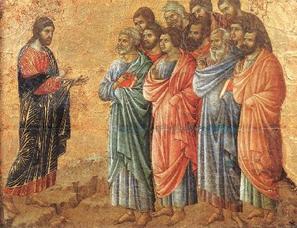 Often we hear people say that common sense is needed in certain situations, or we hear a sort of collective criticism of society saying that we have lost our common sense. I have also heard people say that what we call common sense is not all that common. This begs the question of what exactly is meant by common sense. I think what we call common sense is what the biblical writers referred to as wisdom. And no, it is not all that common these days, nor was it all that common in the days of our ancestors. But common sense is not something that is taught. It clearly is a gift from God which we have to cultivate. It begins like a tender shoot, but with care it will grow. That means it takes a bit of work. Perhaps that is why we have such a struggle with it. Truly, what we call common sense is the ability to make decisions which are seemingly obvious as a good way of proceeding. It means having an intuitive sense of people and situations; it is a sort of ‘know-how’ which seems to come naturally to those who possess it. It is definitely not something learned in a book, but yet it allows one to synthesize everything he or she has learned in order to use it in a way that is beneficial. In biblical terms common sense is what was often referred to as wisdom because it was seen as a gift which was built upon the solid foundation of one’s commitment to prayer and living a Godly life. That is, it seems to come naturally, but in reality it is the result of a gift that one cultivates by learning to be aware of God’s guidance. 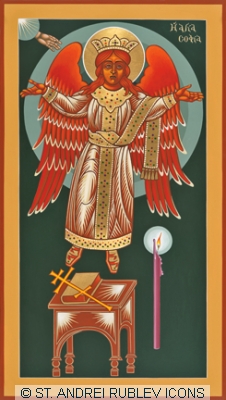 The readings from this Sunday are all about this kind of wisdom. The first reading from the Book of Wisdom highlights the importance of this gift. It is something for which we pray and even beg God to give us. It is to be valued above everything else, including wealth, beauty, and health. “Yet all good things together came to me in her company, and countless riches at her hands.” (Wisdom 7:11) In other words, if we have the gift of wisdom, we will have a different kind of wealth and health, the spiritual kind, which will enable us to see beauty and all of the gifts God has given us. Wisdom helps us to see with the eyes of God so that we make good decisions, living life with gratitude. It does not mean we become perfect, but it means that we are striving to grow in holiness. In the Gospel we see that wisdom is not necessarily the same as knowledge. A rich young man approaches Jesus asking what he needs to do to inherit eternal life. He makes it clear that he knows the commandments and that he lives them. He has knowledge of how to live a life of holiness according to the Law, yet Jesus indicates that he is still a long way off from having what he seeks. This is because the young man does not have the wisdom to see that he is bound to his possessions, and furthermore, he is in God’s presence, yet is not aware of it. In short, this young man lacks wisdom. He is blinded to the fact that he is so attached to his material things that he cannot see the things of Heaven which are right before him. He is not lost, however. Jesus, loving him, offered hope in saying that once he is able to set his priorities straight, once he can become less attached to worldly things, he will be able to follow completely and hence, inherit eternal life. He needed to pray for acceptance of the gift being offered to him, which was the gift of wisdom. 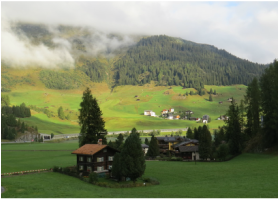 The apostles seemed a bit dismayed at Jesus’ statement to this well-intentioned young man. They feared that no one can be saved if entering the Kingdom is so difficult. But Jesus reassured them that while this may be impossible for human beings, nothing is impossible for God. Jesus was teaching them that wisdom is a gift from God, which our merciful Heavenly Father desires for each of us to have. What follows confirms this. Jesus said: “There is no one who has given up house or brothers or sisters or mother or father or children or lands for my sake and for the sake of the gospel who will not receive a hundred times more now in this present age: houses and brothers and sisters and mothers and children and lands, with persecutions, and eternal life in the age to come.” (Mark 10:29-30) If we are willing to let God guide us into putting our priorities straight, that is, if we put God before all else, we will have everything we began with, but we will use it correctly and we will have a heart for making wise choices. If we read that statement carefully what we see is that we really do not have to give up anything material. What we do have to do is let the Lord direct our hearts and minds to that which builds the Kingdom. If we put God first, follow the way of the gospels, pray for the gift of discernment and wisdom when making choices, putting love and mercy ahead of personal gain, we will have eternal life. You will notice that all the things Jesus says we give up for His sake and the sake of the gospel will be given us in a greater way because they come with eternal life. But we need to live the way of the gospel, which is to live with love and mercy: clothe the naked, give food and drink to the hungering and thirsting, visit the ill and imprisoned; be generous with what we have, forgiving of those who have hurt us, open to the stranger and alien, just to the poor and marginalized, and open to our enemies as well as those who are like ourselves. 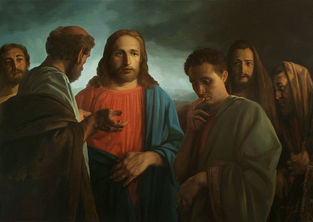 The good news is that we already have the gift of wisdom which directs us in doing the best we can. But it needs to be cultivated by spending time in prayer and discernment. If we do the best we can with what we have and what we know at the time of a decision; if we proceed with what seems to be the most merciful, loving way; if what we decide moves us or another closer to God, then no matter what we do, we have to trust that the gift of wisdom is informing our decision. Our resources will always be limited because we are human. But wisdom consists of accepting the outcome with peace in knowing we did what seemed right given what we knew at the time, even if we discover later that there had been a better way. That is why the wise one is a person of peace: he or she knows that everything happens for a reason and trusts in God’s perfection. They put God first in all they do and they trust that His wisdom is greater than theirs. They are simply being good disciples, such as the apostles, and even the rich young man, desired to be. People who live in this way are people with common sense. That is, it becomes so natural to them that they seem to have a good idea of how to respond in smaller matters and not just the big ones. Growing in wisdom and therefore, common sense, is a process toward which we should be attentive. Every saint learned to use this gift. Why we consider them holy is that they opened themselves up to God’s grace which meant they would have to let go of their bad habits and areas of selfishness. They did not become perfect, but rather, they learned to coexist with the faults and weaknesses they had, offering them again and again to God for purification. They had to live with choices that they realized had not been good, allowing God to purify them as they suffered the pain of knowing they may have acted selfishly. But what made them rise above their faults to become holy was that they loved God so much they were willing to go through this process so that love became their total motivation, no matter whether they were picking up a pin from the floor (St. Thérèse of Lisieux) or whether they were reforming their religious order (St. Teresa of Avila). This is true wisdom: studying the Gospels so we know what Jesus taught, praying to know what glorifies God, and then acting with love and mercy. Like the rich young man, we can learn how to put God first and live a life of mercy and generosity. Then perhaps we will truly have that gift of spiritual common sense known as wisdom. 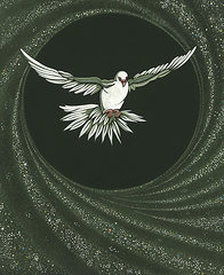 May we pray for right use of the gift of wisdom which we were given at Confirmation! May we be open to learning at the feet of Jesus how to be a better disciple so that we may learn the way of the gospel, the way of wisdom! May we know the right use of material goods as well as spiritual gifts! May we learn to live in gratitude for all that we have been given! And may we learn how to put God first so that we may put love and mercy into all our actions! Let us continue to meet in the merciful and wise heart of Jesus! Peace! ©Michele L. Catanese The first painting is called Jesus and the Eleven by Duccio di Buoninsegna. (1308-11) Second is an image painted by Fr. William Hart McNichols called The Advent of Hagia Sophia. It can be found at http://frbillmcnichols-_sacredimages.com/featured/the-advent-of-hagia-sophia-173-william-hart-mcnichols.html Third is one of my own photos. This was taken in Austria, near the Alps. Fourth is a painting called Christ and the Rich Young Man by A.N. Miranov. All the information on Miranov and his painting can be found at https://commons.wikimedia.org/wiki/File:Christ_and_the_rich_young_man._A.N._Mironov.jpg Last is an image which is part of a larger work called Viriditas by Fr. William Hart McNichols. This segment is called Viriditas-Holy Spirit Detail. It can be found at http://frbillmcnichols-sacredimages.com/featured/viriditas-holy-spirit-detail-william-hart-mcnichols.html
David
10/18/2015 06:19:50 am
Michele, I have to say that this has to be one of my favourite reflections from you. Many, many thanks :) Comments are closed.
|
Heart Speaks to Heart
|

 RSS Feed
RSS Feed

